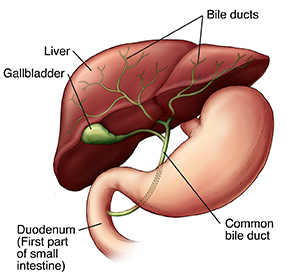A
B
C
D
E
F
G
H
I
J
K
L
M
N
O
P
Q
R
S
T
U
V
W
X
Y
Z
Topic IndexLibrary Index
Click a letter to see a list of conditions beginning with that letter.
Click 'Topic Index' to return to the index for the current topic.
Click 'Library Index' to return to the listing of all topics.
Your Child's HIDA Scan
A HIDA scan is also called a hepatobiliary scintigraphy. It's a test that checks the function of your child’s liver, gallbladder, and bile ducts (tubes that drain the liver and gallbladder). It can show where bile is blocked or leaking. The test uses a special fluid (a safe radioactive material) that shows up on a scan. It takes about 2 hours. The scan part of the test may be done more than once over a 4-hour period. In unusual cases, scanning may be performed over 24 hours.

What to tell your child's healthcare provider
The scan is done by a technologist. For best results and your child’s safety, tell the technologist if your child:
-
Has any allergies or a history of severe allergic reactions
-
Has any health problems
-
Takes any prescription or over-the-counter medicines, herbs, or supplements
-
Has ever had surgery
-
May be pregnant or is pregnant
Before the scan
Your child shouldn’t eat or drink anything for 6 hours before the scan. Unless told otherwise, your child can take any daily medicines with a sip of water.
During the scan
Your child may be given medicine (a sedative) that makes them relaxed and sleepy during the test. During the HIDA scan:
-
Your child lies on their back on a table. The special fluid is put into your child’s vein by a shot (injection) or by IV (intravenous) line.
-
The special fluid travels to the liver and through bile ducts to the gallbladder. A scan is done to follow the fluid’s path.
-
If your child has been having symptoms, such as upset stomach or cramping, these may occur during the scan. This is normal. The symptoms will go away when the scan is over.
-
The provider may inject a hormone called cholecystokinin (CCK) during the scan. This is a hormone that is secreted after you eat a fatty meal. It causes the gallbladder to contract, so bile flows into the first part of the small intestine (the duodenum). If your child has symptoms after the hormone is injected, this may help the provider understand the cause of previous symptoms. In some cases, your child may eat a high-fat meal during the test instead of getting CCK.
After the scan
-
When the scan is finished, your child is taken to a recovery room if sedation was used. They will be watched while recovering from the test.
-
If a sedative is used, it may take a few hours for it to wear off.
-
For certain conditions, the scan may be repeated a few times over a 4-hour period. In unusual cases, scanning may be performed over 24 hours.
-
The results of the scan will be ready in a few days. Your child’s healthcare team will discuss them with you then.
Helping your child prepare
-
Explain the test to your child in short, simple terms. Younger children have shorter attention spans, so do this soon before the test. Tell older children about the test further in advance, so they have more time to prepare.
-
Tell your child that a HIDA scan involves people looking at and touching their belly.
-
Describe how the test will feel, as best you can. A healthcare provider can help. Allow your child to ask questions.
-
Use play when helpful. This can mean role-playing with your child’s favorite toy or object. Older children may want to see pictures that show what happens during the test.
When to call your child's healthcare provider
After the scan, call the healthcare provider if your child has any signs of a reaction to the special fluid (such as pain or a rash). A reaction is unlikely. But if it happens, it can be serious.
Risks and possible complications
-
Exposure to medical radiation (typically low level and considered low risk)
-
Allergic reaction to the injected agents
-
Belly pain or cramping from the CCK injection, if used
Online Medical Reviewer:
Neil Grossman MD
Online Medical Reviewer:
Raymond Turley Jr PA-C
Online Medical Reviewer:
Tara Novick BSN MSN
Date Last Reviewed:
11/1/2022
© 2000-2024 The StayWell Company, LLC. All rights reserved. This information is not intended as a substitute for professional medical care. Always follow your healthcare professional's instructions.